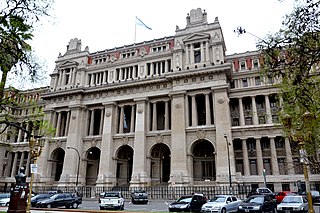Related Research Articles

A judge is a person who presides over court proceedings, either alone or as a part of a panel of judges. The powers, functions, method of appointment, discipline, and training of judges vary widely across different jurisdictions. The judge is supposed to conduct the trial impartially and, typically, in an open court. The judge hears all the witnesses and any other evidence presented by the barristers or solicitors of the case, assesses the credibility and arguments of the parties, and then issues a ruling on the matter at hand based on their interpretation of the law and their own personal judgment. In some jurisdictions, the judge's powers may be shared with a jury. In inquisitorial systems of criminal investigation, a judge might also be an examining magistrate. The presiding judge ensures that all court proceedings are lawful and orderly.

A justice of the peace (JP) is a judicial officer of a lower or puisne court, elected or appointed by means of a commission to keep the peace. In past centuries the term commissioner of the peace was often used with the same meaning. Depending on the jurisdiction, such justices dispense summary justice or merely deal with local administrative applications in common law jurisdictions. Justices of the peace are appointed or elected from the citizens of the jurisdiction in which they serve, and are usually not required to have any formal legal education in order to qualify for the office. Some jurisdictions have varying forms of training for JPs.

The term magistrate is used in a variety of systems of governments and laws to refer to a civilian officer who administers the law. In ancient Rome, a magistratus was one of the highest ranking government officers, and possessed both judicial and executive powers. In other parts of the world, such as China, a magistrate was responsible for administration over a particular geographic area. Today, in some jurisdictions, a magistrate is a judicial officer who hears cases in a lower court, and typically deals with more minor or preliminary matters. In other jurisdictions, magistrates may be volunteers without formal legal training who perform a judicial role with regard to minor matters.
Alcalde is the traditional Spanish municipal magistrate, who had both judicial and administrative functions. An alcalde was, in the absence of a corregidor, the presiding officer of the Castilian cabildo and judge of first instance of a town. Alcaldes were elected annually, without the right to reelection for two or three years, by the regidores of the municipal council. The office of the alcalde was signified by a staff of office, which they were to take with them when doing their business. A woman who holds the office is termed an Alcaldesa.

In England and Wales, a magistrates' court is a lower court which holds trials for summary offences and preliminary hearings for more serious ones. Some civil matters are also decided here, notably family proceedings. In 2015, there were roughly 330 magistrates' courts in England and Wales, though the government was considering closing up to 57 of these. The jurisdiction of magistrates' courts and rules governing them are set out in the Magistrates' Courts Act 1980.

The Supreme Court of Argentina, officially known as the Supreme Court of Justice of the Argentine Nation, is the highest court of law of the Argentine Republic. It was inaugurated on 15 January 1863. However, during much of the 20th century, the Court and the Argentine judicial system in general, has lacked autonomy from the executive power. The Court has recently been reformed by the decree 222/03.
The Hong Kong order of precedence is a nominal and symbolic hierarchy of important positions within the Government of Hong Kong. Administered by the government's Protocol Division, the hierarchy does not determine the order of succession for the office of Chief Executive, which is instead specified by the Basic Law of Hong Kong.

The General Council of the Judiciary (GCJ) (Spanish: Consejo General del Poder Judicial, is the national council of the judiciary of Spain. It is the constitutional body that governs all the Judiciary of Spain, such as courts, and judges, as it is established by the Spanish Constitution of 1978, article 122 and developed by the Organic Law 6/1985 of the Judicial Power. The President of the CGJP is also the president of the Supreme Court.

The Judiciary of Portugal is a system of courts that together constitute one of the four organs of Sovereignty as defined by the Portuguese Constitution. The courts are independent from the other three Portuguese organs of Sovereignty.

The Pontifical Catholic University of Puerto Rico School of Law is settled in an area of 124 acres (0.50 km2) in the City of Ponce, Puerto Rico on the Pontifical Catholic University of Puerto Rico main campus. It was established in 1961.

The Supreme Court is the highest court in the Kingdom of Spain. Originally established pursuant to Title V of the Constitution of 1812 and currently regulated by Title VI of the Constitution of 1978, it has original jurisdiction over cases against high-ranking officials of the Kingdom and over cases regarding illegalization of political parties. It also has ultimate appellate jurisdiction over all cases. The Court has the power of judicial review, except for the judicial revision on constitutional matters, reserved to the Constitutional Court.
The Professional Association of Magistrates is one of the five Spanish, professional associations of judges and magistrates. Since judges and magistrates in Spain are barred from joining trade unions, professional associations such as APM have adopted the traditional union role of protecting their employment rights and conditions. APM is the biggest professional association of judges and magistrates in Spain and is considered to be ideologically conservative.
Marcia Gail Cooke is an American lawyer and United States District Judge of the United States District Court for the Southern District of Florida.

In United States federal courts, magistrate judges are judges appointed to assist district court judges in the performance of their duties. Magistrate judges are authorized by 28 U.S.C. § 631et seq. The position of "magistrate judge" or "magistrate" also exists in some unrelated state courts.

The Judiciary of Spain consists of Courts and Tribunals, composed of judges and magistrates (Justices), who have the power to administer justice in the name of the King of Spain.
In an inquisitorial system of law, the examining magistrate, is a judge who carries out pre-trial investigations into allegations of crime and in some cases makes a recommendation for prosecution. The exact role and standing of examining magistrates varies from jurisdiction to jurisdiction; common duties and powers of the examining magistrate include overseeing ongoing criminal investigations, issuing search warrants, authorizing wiretaps, making decisions on pretrial detention, interrogating the accused person, questioning witnesses, examining evidence, and compiling a dossier of evidence in preparation for trial. Examining magistrates have an important role in the French judiciary, and are also a feature of the Spanish, Dutch, Belgian and Greek criminal justice systems, although the extent of the examining magistrate's role has generally diminished over time. Several countries, including Switzerland, Germany, Portugal, and Italy, have abolished the position of examining magistrate outright.

In the legal system of England and Wales, there is a history of involving lay people, namely people from the local community who are not required to hold any legal qualifications, in the judicial decision-making process of the courts. They are called justices of the peace or magistrates.

R v Bow St Metropolitan Stipendiary Magistrate [2000] 1 AC 61, 119 and 147 is a set of three UK constitutional law judgments by the House of Lords that examined whether former Chilean dictator Augusto Pinochet was entitled to claim state immunity from torture allegations made by a Spanish court and therefore avoid extradition to Spain. They have proven to be of landmark significance in international criminal law and human rights law.
The Judiciary of Bangladesh or Judicial system of Bangladesh is based on the Constitution and the laws are enacted by the legislature and interpreted by the higher courts. Bangladesh Supreme Court is the highest court of Bangladesh. The jurisdiction of the Supreme Court of Bangladesh has been described in Article 94(1) of the Constitution of Bangladesh. It consists of two divisions, the High Court Division and the Appellate Division. These two divisions of the Supreme Court have separate jurisdictions.

In France, a cour d’appel of the ordre judiciaire (judiciary) is a juridiction de droit commun du second degré, a. It examines judgements, for example from the correctional tribunal or a tribunal de grande instance. When one of the parties is not satisfied with the verdict, it can appeal. While communications from jurisdictions of first instance are termed "judgements", or judgments, a court of appeal renders an arrêt (verdict), which may either uphold or annul the initial judgment. A verdict of the court of appeal may be further appealed en cassation. If the appeal is admissible at the cour de cassation, that court does not re-judge the facts of the matter a third time, but may investigate and verify whether the rules of law were properly applied by the lower courts.
References
- ↑ "Sustainable Water Management in Cities". UN. December 2010. Retrieved 23 April 2013.CS1 maint: discouraged parameter (link)